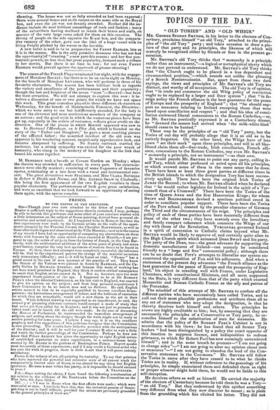FRESCO. TO THE EDITOR OF THE SPECTATOR. SIR — Though your own
note attached to the letter of your Constant Reader is sufficient reply to the suggestions therein contained, I may, perhaps, be able to furnish this gentleman and some other of your constant readers with a little information on the subject of fresco-painting, derived from personal ob- servation and actual experience. As I happened tube in Rome at the time the first experiments were made by the German artists on the walls of the apart- ments occupied by the Prussian Consul, the Chevalier BARTHOLDY, as well as those afterwards begun and abandoned at the Villa Massimi,—and as in the course of my travels I have had an opportunity of comparing my observations on these works with frescoes by the same artists since executed at Munich,—I am pre- pared to say, the series of subjects from the history of Joseph, in the Casa Bar- tholdy, with the emblematical additions of the seven years of plenty and seven years famine, comprise the very best specimens of modern fresco to be found in Europe. if, then, these first attempts were completely successful, the inference will be, that to the experienced painter the change of the material occasions only momentary difficulty : and so it will be found on trial. "Fresco " has a grand sound in the ears of men ignorant of the practice of art. They know the Stanze of the Vatican were painted in fresco by RAPHAEL, and the Ca- pella Sistina by MICHAEL ANGELO; and because this mode of working has not been much practised in England, they think it confers critical consequence to assert that English artists cannot do it. Not so, however, says the most experienced fresco-painter of the age. I happened to be at Sir ROBERT PEEL'S when the director CORNELIUS, on his last visit to England, was courted to give his opinion on the subject ; and from long personal acquaintance I know CORNELIUS to be an honest man and no flatterer. He said, English artists seemed to him to be especially qualified to become excellent fresco- painters : the harmonious arrangement of colour, and the boldness of execution for which they are remarkable, would add a new charm to the art in their hands. When deficient drawing was suggested as an impediment, he said, the necessity of preparing elaborate cartoons would compel a mode of study that bad never yet been called for in England ; and it was not just to presume the talent coat not be found, till the call were made. In the case of decorating the Houses of Parliament, he recommended the immediate arrangement of subjects, and setting about the designs though the walls might not be ready to receive painting for some years. 1 believe I may say, it is on the confident prophecy and wise suggestions of this judicious foreigner that the Commission Is now proceeding. The results have hitherto accorded with the anticipations of the director ; and it will be well for your Constant Reader to wait a little and watch the further proceedings of the Commission. Perhaps be does not know that Prince ALBERT has given the opportunity to eight English artists of established reputation to make experiments, in a summer-house lately erected by Mr. BLORE in the gardens of Buckingham Palace. Report speaks most favourably of these experiments; and if 1 may credit a German artist who has seen the work in progress, there is little doubt that it will prove entirely satisfactory.
Fresco is the infancy of art, oil-psinting its maturity. To say that painters
who have mastered the powerful and extensive scale of oil cannot reach the comparatively limited scale of fresco, is too absurd for any thing but English ignorance. Because a man writes fine poetry, is it impossible he should succeed
in prose ? A TRAVELLED.
E.S.—Since writing the above, I have found the following corroboration of any opinion in the evidence of Mr. EASTLAKE before the Committee on the Fine Arts, 4th June 1841- 567. - - - " I was in Rome when the first efforts were made: which were successful at once. I conclude from this, that the technical process of fresco- painting is not in itself difficult, provided the artists are previously grounded in the general principles of their art."


























 Previous page
Previous page